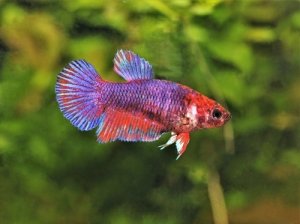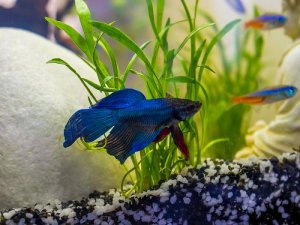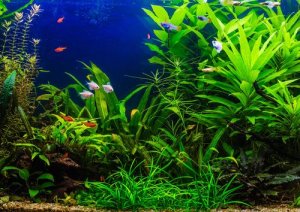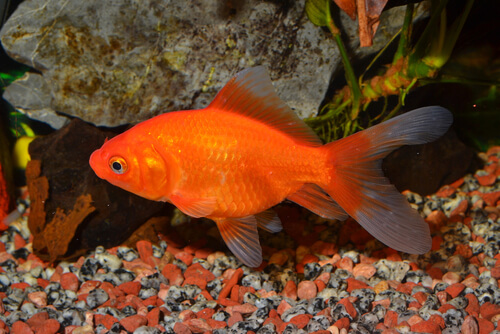
Owning a Goldfish is a purely mesmerizing experience. With a simple lifestyle and relatively mellow routine, these freshwater swimmers are great pets. Taking care of them is also relatively easy if you know what you’re doing, especially in an indoor aquarium.
As a goldfish owner, an exciting part of the experience has to be feeding time. When you’ve got their food ready, you’ll probably be psyched watching it excitedly flap around in anticipation! Those moments are truly worth the aquarium costs.
Seeing your goldfish completely refusing a tasty treat can be a bit disheartening. But, if you’re dealing with this problem or know someone with a goldfish facing this issue, we’ve got you covered with this detailed article. Here, you’ll learn what to do about a goldfish not eating its food anymore. The information here covers goldfish diets, signs of poor health, and solutions to their weak appetites.
The Importance Of A Healthy Diet In A Goldfish
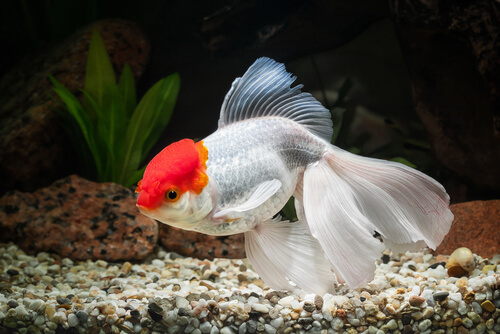
Although there’s a popular belief that goldfish have short lifespans, that can’t be further from the truth. In truth, these omnivores are able to live long and fulfilling lives. For example, the longest-living goldfish was able to survive for up to 49 years. While this may be so, the average goldfish in your indoor aquarium can live for up to 10 years. That’s a respectable feat and enough time to share a long-lasting bond.
Keeping your fish alive for long enough does not have to be a complicated process. While there are common causes of goldfish death, diet plays a massive part in why you may lose them. So you’ll serve your pet best by focusing on giving them nutritious fish foods and adhering to proper feeding practices.
As omnivores, goldfish enjoy a good dose of balance in their diets. Sure, they’ll eat anything edible, but a healthy goldfish requires a regular amount of live food that makes up a diet rich in nutrients. Enjoyable treats such as insect larvae, fish eggs, leafy greens, and bananas provide a power-packed meal.
Goldfish Not Eating? Here’s Why
It’s not a great feeling to be worried about your goldfish, and finding a solution to your pet’s troubles is probably at the top of your list. These are some reasons why your goldfish are not eating their food.
1. Overfeeding
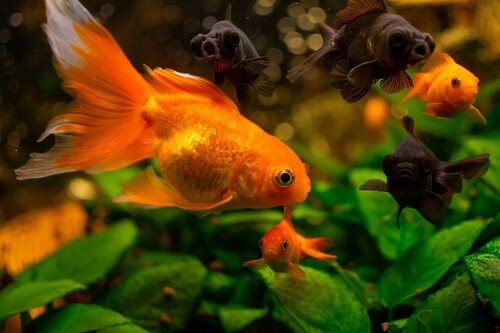
When you own a goldfish, it can be easy to get carried away with the fact that it gobbles up anything edible within its tank. However, that unquenchable appetite can be deceiving. It is merely a result of goldfish being unable to think about the consequences of their actions. Goldfish don’t seem to care about anything beyond their short-term satisfaction in those moments, like a toddler grabbing a tub of ice cream and diving face first.
That’s where you come in. As a pet owner, it’s your duty to know the correct quantity of food that should be given to a goldfish. It’s best to get your information right, and as a rule of thumb, you should only be feeding your goldfish 2-3 times a day. In addition, use food that can easily be consumed in less than two minutes.
Overfeeding is not a pretty sight, and witnessing a pet, you love deal with its effects is pretty sad. However, it’s one of the potential causes of goldfish death that can be addressed with some immediate treatment. So if you’re dealing with your goldfish not eating anything, overfeeding should be the first thing you question.
You might be wondering, how do I know if my usually healthy goldfish is dealing with the effects of overfeeding? Here are some symptoms:
- Swimming Awkwardly
If you’re suspicious of overfeeding, check your goldfish’s swimming patterns. Like all other fish, buoyancy is vital to a goldfish’s movements. If it seems to be floating upside-down, rolling to the side, or swimming sideways, you may be dealing with swim bladder disease.
Overeating usually leads to swim bladder disease, and this is something you should look out for. A swim bladder is a gas-filled sac that helps balance a goldfish in the water. If your goldfish overeats, there’s a chance that its organs are pressing against the swim bladder, throwing it off balance.
In this situation, it’s best to avoid feeding your goldfish for 48 hours. This is necessary if you want to let its digestive system clear out. Then, if it still seems to be swimming awkwardly, try feeding it a cooked pea. Peas are rich in fiber and should help clear any digestion problems.
- Cloudy Water
If the water in your aquatic friend’s tank is beginning to look foggy, this might be due to your goldfish not eating and leaving untouched food to waste. In this situation, it’s best to do a water change, as leaving it this way is another of the leading causes of goldfish death.
- Struggling To Breathe
A goldfish floating to the top of its tank and releasing air bubbles is a strong indicator that it has been overfed. When there’s a lot of waste in a tank, the oxygen levels begin to deplete, resulting in your goldfish swimming up in an attempt to get oxygen. If your goldfish displays these symptoms, you should clean your tank immediately to keep it safe and healthy.
- Food At The Surface Of The Tank
Goldfish may sometimes be overwhelmed by the amount of food being fed to them. Suppose your fish has already had way too much to eat. In that case, you will find them sticking to the bottom and not wanting to eat.
2. Poor Water Quality
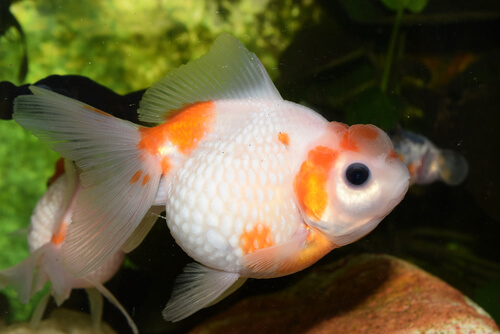
A goldfish may struggle to survive when its tank is dirty. There are many ways this can happen, and one of the most significant indicators of a dirty tank is the lack of appetite in your goldfish. Therefore, the water quality in a goldfish tank is extremely important. Without the correct water parameters, there can be various complications.
Living in filth is no fun for humans, and goldfish share that sentiment. They need to thrive in a clean environment.
It would help if you avoided these conditions as they are one of the causes of goldfish illness. Here are a few guidelines to stick to when changing the water in your goldfish’s tank.
First, avoid the build-up of toxins such as ammonia, nitrate, or nitrite. There’s also a balance that should be prioritized in terms of the temperature of the water. It can’t be too low or too high. Meanwhile, you’ll also need to pay attention to the pH balance, toxins, oxygen levels, and carbon dioxide.
Keeping track of all your fish’s requirements is challenging, but you’re not expected to be a biology genius to care for goldfish. That’s why there are aquarium water test kits that can help with these measurements. You can find them at local pet shops or dedicated fish shops.
3. Unhappy With The Food
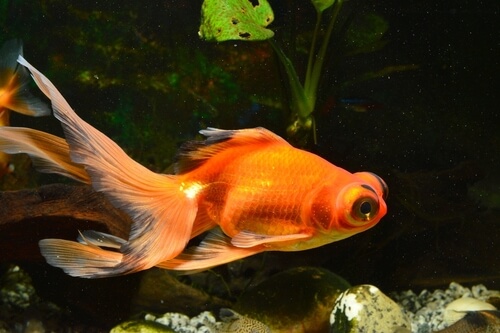
Yes, you read that right. Goldfish are usually ready to eat anything they can, but even they have limits. If your pet isn’t happy with what you’re feeding it, your goldfish not eating the food may be a form of protest.
There isn’t much to feel bad about in this situation. All you really need to do is find some new varieties of goldfish food to give it. Then, if it latches on to the new pellets, the fish will be perfectly fine and return to its usual happy self.
4. Infections
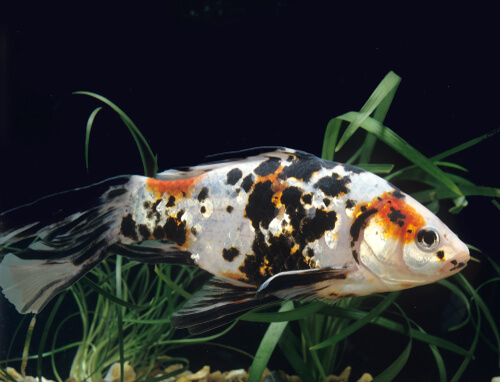
This is one of the scariest causes of goldfish illness. Infection can present itself in many ways. A goldfish not eating food is one of them, and a highly dangerous one. Goldfish, like other animals, are susceptible to disease-causing agents such as bacteria, fungi, viruses, and parasites.
When a goldfish is exposed to an infection, you might want to take a look at how you may have introduced the disease to the tank. This usually happens when you introduce new plants and tankmates that could be a carrier of some disease. It can often be easy to miss, but you should quarantine all new plants and fish before adding them to the tank.
Many diseases on goldfish require microscopic examinations before they can be diagnosed. There are a few exceptions, such as fish lice and white spot disease, which are visible to the naked eye. However, this does not mean they are less dangerous. When you’re unsure of the illness your pet has, you may need to have an aquatic veterinarian take a look. With the proper diagnosis and treatment, your goldfish will be happily swimming around in no time.
5. Stress
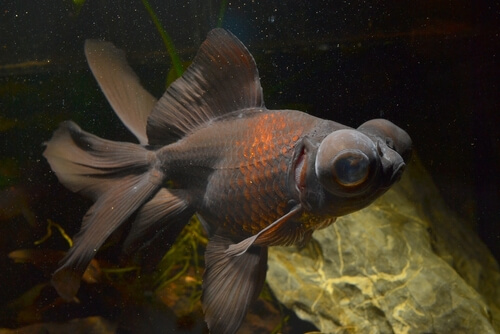
Sometimes, goldfish cannot maintain a strong appetite due to stress. The best way to tell if your aquatic friend is under a lot of stress is by watching its behavior. For example, you notice it staying at the bottom of the tank, gasping for air. It could be a strong indicator that your goldfish is extremely stressed out.
Stress affects the immune system of a goldfish and can lead to many health issues. The most effective way to deal with stress in a goldfish is by removing stressors. Unfortunately, goldfish can sometimes be too bothered by their tankmates, especially when pregnant or even during a change of environment.
Besides these, you’ve also got to have a balanced diet and good water quality to avoid dealing with stress in your goldfish.
Final Thoughts
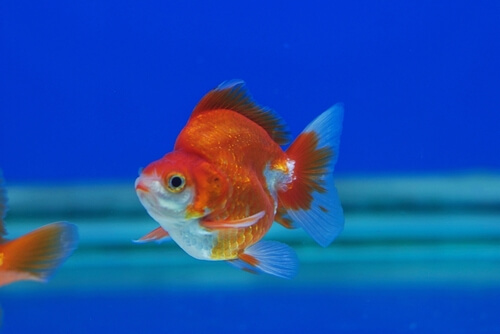
Caring for a goldfish is best done when you’ve got preventive measures in place to avoid dealing with complications. If you’re consistent with your routines and careful with how you feed them, you’ll be able to maintain a healthy pet! One should never forget that goldfish, like other pets, will get sick at some point. So when they do, go through the necessary checks and fix the issue quickly to get your goldfish back to its usual self.


